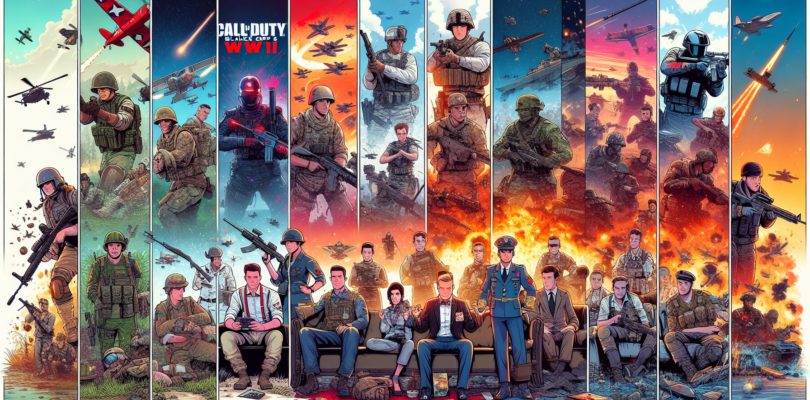Introduction
The Call of Duty (CoD) series has been a cornerstone of the gaming industry for over two decades. Developed by Activision, this series has spanned numerous installments that have captured the attention of gamers worldwide. From its humble beginnings to its status as a billion-dollar franchise, Call of Duty has evolved dramatically, both in terms of technology and gameplay mechanics. In this article, we explore the journey of this iconic series, understanding key developments and shifts in its design and influence.
Origins and Early Success
The Call of Duty franchise began in 2003 with its first title, simply named Call of Duty. Unlike other war-themed video games of the time which focused heavily on single-player campaigns, CoD distinguished itself with squad-based gameplay and AI-controlled allies who could execute commands given by the player. This initial game, set during World War II, laid the foundation for the series with its immersive narrative and attention to historical detail.
The success of the original spawned several sequels that expanded on its themes and mechanics. Notable titles like Call of Duty 2 (2005) and Call of Duty 3 (2006) continued to build on the World War II narrative, but it was Call of Duty 4: Modern Warfare (2007) that marked a significant turning point for the franchise. This game shifted the setting to modern times, which resonated strongly with players and critics alike, and introduced a new level of graphic fidelity and multiplayer experiences.
The Modern Warfare Impact
Call of Duty 4: Modern Warfare not only revolutionized the series but also the entire first-person shooter genre. The game’s narrative depth, character development, and realistic depiction of military operations set a new standard for storytelling in video games. Furthermore, Modern Warfare’s multiplayer component introduced features like killstreaks, XP gains, and customizable loadouts that became staples in the genre.
Expanding the Narrative and Multiplayer Experience
Following the success of Modern Warfare, the franchise expanded further with titles such as Modern Warfare 2 and Modern Warfare 3. Each sequel built upon the previous game’s success by offering more intricate narratives and enhanced multiplayer modes. The series also began to explore other historical contexts again, with releases like Call of Duty: World at War which returned to a World War II setting but introduced new technology and a much-praised zombie mode.
The Introduction of Black Ops
In 2010, the Call of Duty series saw another significant addition with Call of Duty: Black Ops. Developed by Treyarch, Black Ops set during the Cold War period, introduced gamers to covert warfare and psychological operations. The game’s narrative was praised for its storytelling and depth, and it brought new aspects of gameplay including the use of period-specific technology and deeper character backgrounds. Black Ops also expanded on the franchise’s zombie narrative, creating a whole subculture within the CoD community.
Subsequent installments in the Black Ops series continued this trend, pushing boundaries in narrative complexity and multiplayer capabilities. With each release, such as Black Ops II and Black Ops III, Treyarch introduced futuristic warfare technology and increasingly robust multiplayer options.
Recent Developments and Future Directions
More recent iterations of the Call of Duty series, such as Call of Duty: Warzone, have embraced the battle royale format, competing with other popular online games like Fortnite and PUBG. Warzone integrates traditional Call of Duty combat mechanics with large-scale, survivor-style gameplay, making it a significant entry in the franchise’s history.
The franchise’s continuous innovation is also evident in Call of Duty: Vanguard and the revisits to Modern Warfare with reboots and remastered versions, adapting historical narratives with the latest gaming technology. Each game not only advances the technical and narrative aspects of the franchise but also reflects on modern issues and historical events, creating a blend that keeps the series relevant and engaging.
Conclusion
From its World War II roots to modern-day and futuristic settings, the Call of Duty series has continually adapted to the changing landscape of gaming and player expectations. As one of the most influential franchises in the gaming industry, Call of Duty has set high standards for innovation and storytelling. Its evolution remains a testament to the dynamic nature of video games as a form of interactive entertainment and cultural commentary.





